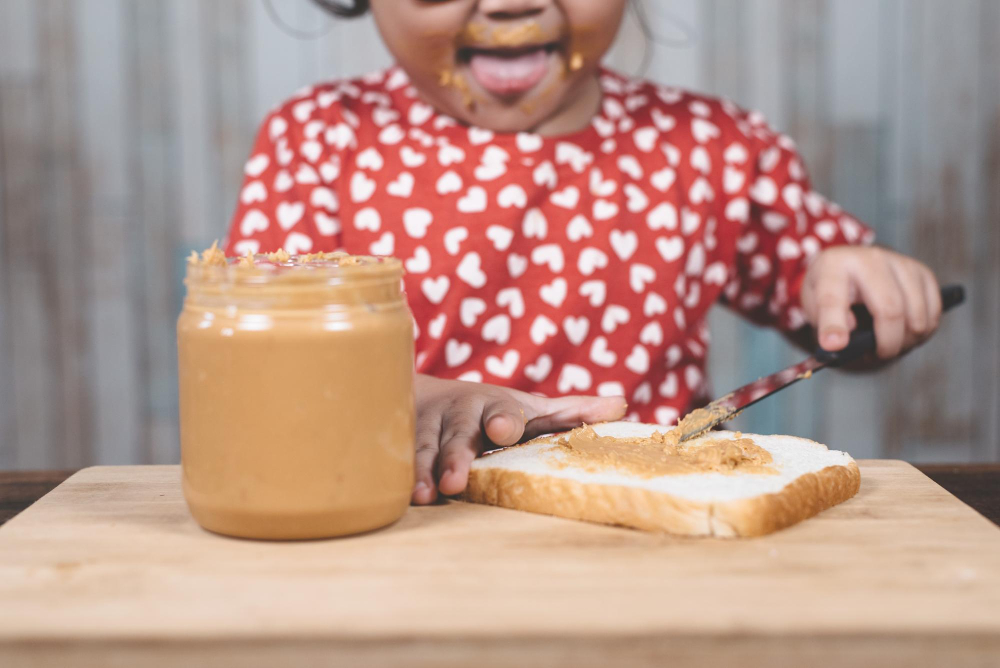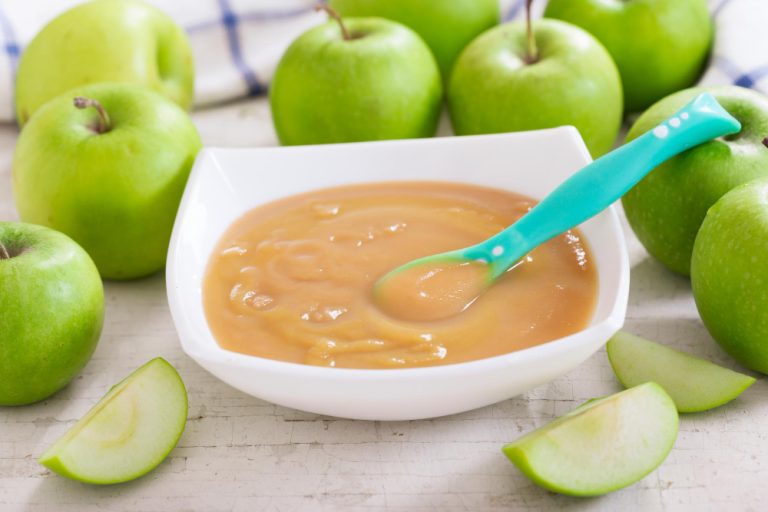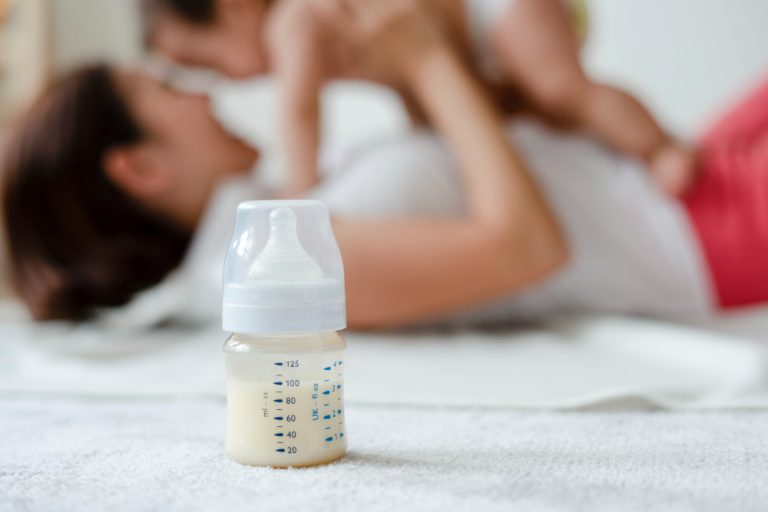How To Introduce Peanut Butter To Baby? Safety Tips
Are you ready to undertake a delicious journey with your little one and introduce the tantalizing taste of peanut butter into their diet? Do you know how to introduce peanut butter to baby? The thought of your baby’s eyes lighting up with curiosity and delight as they savor new flavors and explore unique textures.
But wait – before you dive in, have you ever pondered how to navigate this exciting yet crucial moment with caution and care to ensure a safe and smooth introduction to this beloved food?
As a parent, you may find yourself in the world of solid foods, feeling a mix of thrill and anxiety, especially when it comes to potential allergens like peanut butter. How do you provide your baby with nutritious options while minimizing risks associated with allergies?
This blog is here to quench your curiosity and guide you through the process, offering expert advice and practical steps to safely incorporate peanut butter into your baby’s diet.
So, are you ready to dive into essential topics such as the proper age for introducing peanut butter, ways to mitigate allergy risks, and the invaluable benefits of adding this nutrient-rich food to your baby’s meals?
Stay tuned for detailed instructions on how to introduce peanut butter to baby, ensuring your little one’s health and well-being every step of the way. Let’s undertake this flavorful and fulfilling journey together!
Legumes and Babies

Peanuts, classified as legumes, are not actually nuts but rather seeds that grow underground. They are often referred to as “groundnuts” due to this characteristic. Peanuts are a popular food due to their various health benefits and versatile usage.
When it comes to how to introduce peanut butter to baby, it’s important to note that they can be a nutritious addition when done correctly.
In terms of benefits, peanuts are a rich source of plant-based protein, healthy fats, vitamins, and minerals. They provide essential nutrients such as folate, niacin, vitamin E, and magnesium, which are crucial for a baby’s growth and development. Peanuts also contain antioxidants that can help support the immune system and combat inflammation.
Furthermore, incorporating peanuts into a baby’s diet can contribute to a reduced risk of developing nut allergies later in life. Studies have shown that early exposure to peanuts can actually help prevent peanut allergies in children who are at high risk. However, it is essential to approach the introduction of peanuts with caution, especially if there is a family history of allergies.
When introducing peanuts to your baby, always consult with your pediatrician or a pediatric allergist to determine the appropriate timing and method. They will assess your baby’s individual risk factors, such as any existing allergies or eczema, and provide personalized guidance.
Remember, introducing peanuts should be a gradual process, starting with small amounts and closely monitoring your baby’s reaction. It’s also important to ensure that peanuts are served in a safe and age-appropriate form, such as smooth peanut butter or peanut flour mixed with vegetable puree.
By understanding the benefits and following expert advice, you can safely introduce peanuts to your baby’s diet, promoting their health and nutrition.
Caution! Introducing Peanut Butter to Baby

It is crucial to exercise caution when introducing peanuts and peanut butter to your baby, as they can be potential allergens. Peanut allergies are one of the most common food allergies among infants and children, and allergic reactions can range from mild to severe.
The American Academy of Pediatrics recommends introducing peanuts to infants who do not have a history of allergies or eczema between 4 to 6 months of age. However, it is important to consult with your baby’s pediatrician before introducing peanuts or peanut butter, especially if there is a family history of allergies or eczema.
Symptoms of a peanut allergy can vary from hives or skin rashes to more severe reactions, such as difficulty breathing or anaphylaxis. In some cases, even a small amount of peanut protein can trigger a serious allergic response.
To minimize the risk of an allergic reaction, it is best to introduce peanuts or peanut butter in small amounts and gradually increase the quantity over time. Start with a thin layer of smooth peanut butter on a spoon, or mix a small amount of smooth peanut butter into a vegetable puree. Observe your baby closely for any signs of a food allergy after each introduction.
Remember, if your baby shows any signs of an allergic reaction, seek immediate medical attention. It is always advisable to consult with your baby’s doctor or a pediatric allergist before introducing peanuts or peanut butter, especially if you have any concerns about your baby’s health or potential allergies.
Taking necessary precautions and closely monitoring your baby’s reaction will help ensure a safe and smooth introduction to peanuts and peanut butter.
When Can Babies Have Peanuts?

Introducing peanuts to babies is an important milestone that should be approached with caution. The American Academy of Pediatrics used to recommend delaying the introduction of peanuts until after a baby’s first birthday, especially if there was a family history of allergies.
However, research conducted in recent years has shown that early introduction of peanuts actually reduces the risk of developing peanut allergies.
Here are the recommended age ranges for introducing peanuts to babies:
4 to 6 months old
For babies who are at high risk of developing allergies (e.g., those with severe eczema or an existing food allergy), it is recommended to consult with a pediatric allergist before introducing peanuts. They may recommend an allergy test or supervised peanut introduction.
6 months old +
For babies without any known allergies or eczema, it is safe to start introducing peanut products like smooth peanut butter or peanut butter puffs as soon as they start on solid foods. Begin with a small amount to assess their tolerance and gradually increase the serving size.
12 months old +
By the time babies reach 12 months, most can safely consume whole peanuts or larger quantities of peanut butter. Be cautious and watch for any signs of an allergic reaction.
18 months old +
At this age, babies can generally consume peanuts and peanut products without any specific restrictions. However, continue to monitor for any adverse reactions.
24 months old +
By this age, most children can safely enjoy peanuts and peanut butter as part of a balanced diet without concerns about choking or allergies.
Remember, it’s important to always consult with your baby’s doctor before introducing peanuts or peanut products, especially if your baby has a medical history of allergies or other conditions. Each baby is unique, and the guidance may vary based on individual circumstances.
References:
American Academy of Pediatrics. (2017). Addendum Guidelines for the Prevention of Peanut Allergy in the United States. Pediatrics, 139(2). doi: 10.1542/peds.2016-3414
Are Peanuts Healthy For Babies?

Introducing peanuts as part of a baby’s diet can offer numerous health benefits for their growth and development. Here are some key nutritional advantages to consider:
Nutrient-rich profile
- Peanuts are packed with essential nutrients that are important for a baby’s overall health.
- They are an excellent source of protein, which is essential for growth and building strong muscles.
- Peanuts also contain healthy fats, including monounsaturated and polyunsaturated fats, which are beneficial for brain development.
Vitamins and minerals
- Peanuts are rich in various vitamins and minerals that support a baby’s overall well-being.
- They are particularly high in vitamin E, which is an antioxidant that helps protect cells from damage.
- Additionally, peanuts provide minerals such as magnesium, phosphorus, and potassium, which are crucial for healthy bone development.
Fiber content
- Fiber plays a vital role in maintaining healthy digestion.
- Peanuts are a good source of dietary fiber, promoting regular bowel movements and preventing constipation in babies.
- Including peanuts in their diet can contribute to a well-rounded and balanced fiber intake.
Antioxidant properties
- Peanuts contain antioxidants such as resveratrol, which have been linked to various health benefits.
- These antioxidants help protect the body’s cells from damage caused by harmful free radicals, reducing the risk of certain diseases.
Protein alternative for allergies
- In cases where a baby has allergies to other protein sources, such as dairy or soy, peanuts can serve as an alternative protein option.
- However, it’s essential to consult with a pediatrician or allergist before introducing peanuts to a baby with existing allergies.
Remember, while peanuts offer nutritional benefits, it’s crucial to introduce them to your baby in an appropriate manner and be aware of any potential allergies. Always consult with a healthcare professional before incorporating peanuts or peanut products into your baby’s diet.
Is Peanut Butter Healthy for Babies?
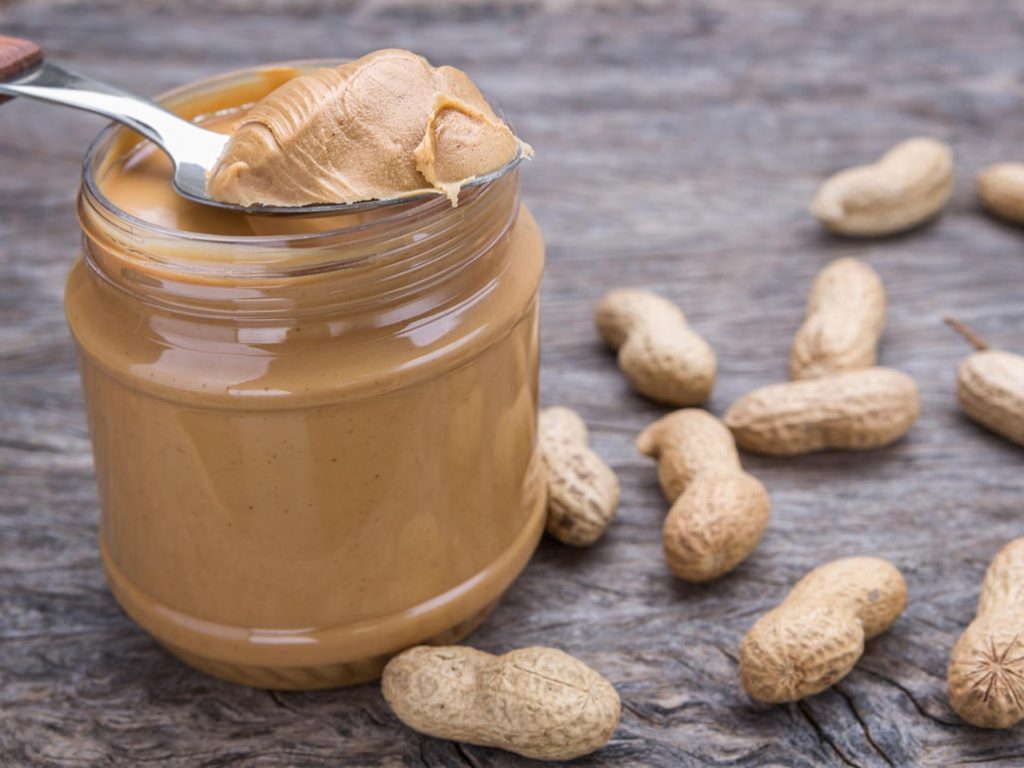
Peanut butter is a nutritious food that can be a valuable addition to a baby’s diet. It offers several health benefits and is a good source of essential nutrients.
Here’s why peanut butter is considered healthy for babies:
1. Nutritional value
Peanut butter is rich in protein, healthy fats, and fiber. It also contains vitamins and minerals like vitamin E, magnesium, and potassium, which are important for a baby’s growth and development.
2. Energy source
The healthy fats in peanut butter provide a concentrated source of energy for active babies. It can help support their physical activity and promote healthy weight gain.
3. Healthy development
Peanut butter is a natural source of plant-based protein, which is essential for muscle and tissue development. It also contains important amino acids that aid in overall growth and brain development.
4. Nutrient absorption
Certain nutrients in peanut butter, such as vitamin E, are fat-soluble, meaning they are better absorbed when consumed with dietary fats. Peanut butter’s healthy fats can enhance the absorption of these important nutrients.
5. Satiety
Peanut butter’s combination of protein, healthy fats, and fiber can help keep babies feeling fuller for longer, reducing the likelihood of overeating and promoting balanced meals.
When introducing peanut butter to babies, it’s important to choose a smooth and creamy variety, as chunky or crunchy peanut butter may pose a choking hazard. Start with a small amount mixed with breast milk, formula, or vegetable puree, and observe how your baby tolerates it. If there are no signs of an allergic reaction, gradually increase the amount.
Remember, if your baby has a family history of peanut allergies or other food allergies, consult with their pediatrician before introducing peanut butter. They may recommend an allergy test or a different approach to ensure a safe and smooth transition.
In conclusion, peanut butter is a healthy and nutritious food for babies. It provides essential nutrients, promotes healthy development, and can be part of a balanced diet when introduced appropriately.
Are Peanuts a Common Allergen?

Peanuts are indeed one of the most common allergens among infants and children. Peanut allergies can cause serious reactions, ranging from mild symptoms like hives or an upset stomach to severe reactions such as difficulty breathing or anaphylaxis.
It is estimated that about 1-2% of children in the United States are allergic to peanuts, making it crucial for parents to be cautious when introducing peanuts and peanut products to their babies.
Research has shown that early introduction of peanuts can actually help reduce the risk of developing a peanut allergy. In fact, the American Academy of Pediatrics now recommends introducing peanuts to babies as early as 4-6 months of age, especially if they have a high risk of allergies. Babies with severe eczema or an existing food allergy are considered to be at a higher risk.
It’s important to note that prior to introducing peanuts or peanut products to your baby, it is always recommended to consult with their pediatrician or a pediatric allergist. They can provide guidance specific to your baby’s individual health and risk factors.
When introducing peanuts, it is generally advised to start with a small amount, such as a thin spread of smooth peanut butter mixed into a vegetable puree. This gradual introduction allows you to monitor your baby for any signs of a food allergy or adverse reaction.
If you notice any concerning symptoms, such as trouble breathing or severe hives, seek medical advice immediately.
By following proper guidelines and early introduction under medical supervision, the majority of infants can safely enjoy peanuts and benefit from their nutritional value without developing an allergy. However, it is always important to be aware of the signs of a peanut allergic reaction and to promptly seek medical help if any symptoms arise.
Remember, if your baby has already been diagnosed with a peanut allergy or has a family history of peanut allergies, it’s crucial to avoid peanuts and peanut products completely unless advised otherwise by a healthcare professional.
Are Peanuts a Choking Hazard for Babies?

When introducing peanuts and peanut butter to babies, ensuring their safety is crucial. One common concern parents have is whether peanuts pose a choking hazard. While any food can potentially be a choking hazard, there are precautions you can take to minimize the risk.
Here are some guidelines for serving peanuts and peanut butter to babies safely:
1. Age-appropriate consistency
- For babies between 6 to 12 months old, it’s important to offer smooth peanut butter or finely ground peanuts.
- This helps reduce the risk of choking compared to whole peanuts, as their texture can pose a danger.
2. Thinly spread on toast or crackers
- If you’re introducing peanut butter, ensure it is thinly spread on age-appropriate finger foods like toast or crackers.
- This allows them to safely explore the taste and texture without the risk of large sticky blobs.
3. Age-appropriate portion sizes
- Begin with small amounts to minimize any potential choking hazard.
- A teaspoon of smooth peanut butter or a peanut butter puff is a suitable starting point.
4. Supervision
- Always closely supervise your baby while they eat to ensure their safety.
- Avoid distractions and be present to promptly respond if any choking occurs.
5. First aid knowledge
- Familiarize yourself with infant CPR and choking rescue techniques.
- Being prepared can help you act quickly in case of an emergency.
Remember, every baby is different, and it’s essential to consider your child’s developmental stage and oral motor skills when introducing peanuts and peanut butter. Consult with your pediatrician for personalized guidance based on your baby’s individual needs.
By following these guidelines, you can introduce peanuts and peanut butter safely, providing your baby with the opportunity to experience their nutritional benefits without compromising their well-being.
How to Introduce Peanut Butter to Baby?
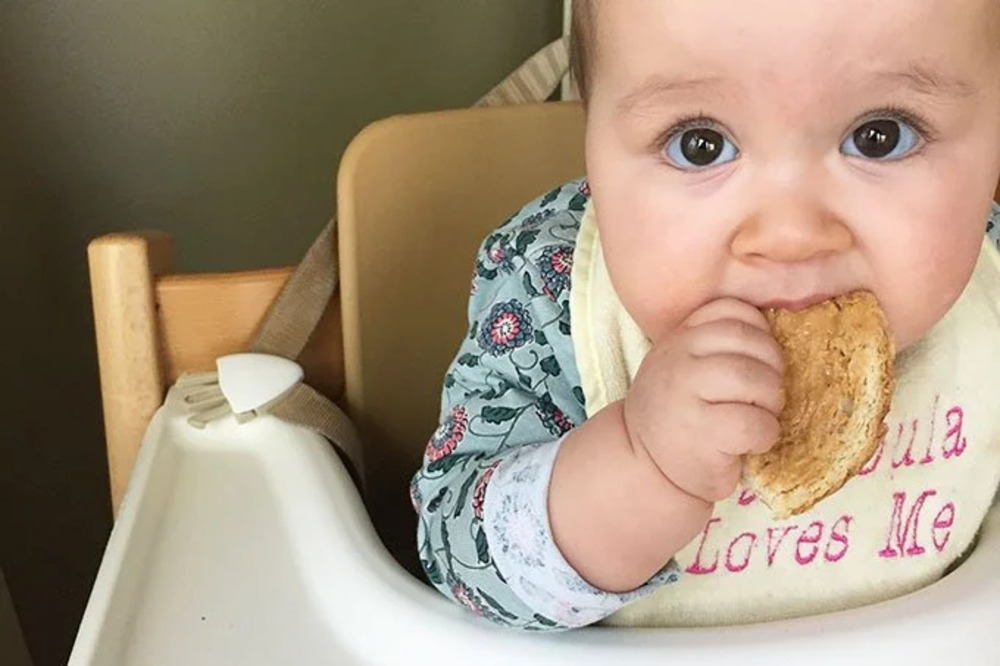
Introducing peanuts and peanut butter to babies can be an exciting and important step in their transition to solid foods. However, it’s crucial to serve them in a safe and age-appropriate manner.
Here are some guidelines for serving peanuts and peanut butter to babies based on different age groups:
4 to 6 months old
- At this stage, babies typically just start their journey into solid foods.
- To introduce peanuts, it’s important to consult with their pediatrician first.
- They may recommend adding a small amount of peanut flour or peanut butter to a vegetable puree or breast milk.
- Start with no more than 1/4 teaspoon of smooth peanut butter, and closely observe your baby for any signs of a food allergy or adverse reactions.
6 months old +
- Once your baby is around 6 months old, you can continue introducing peanuts and peanut butter by adding a small amount to pureed fruits or vegetables.
- Make sure the consistency is appropriate for their age, and gradually increase the amount as your baby becomes more comfortable with solid foods.
- Always supervise closely to watch for any signs of an allergic reaction.
12 months old +
- By the time your baby reaches their first birthday, they can safely enjoy small pieces of whole peanuts or peanut butter puffs as a snack.
- You can also spread a thin layer of smooth peanut butter on bread or offer it as a dip for fruits or vegetables.
- Remember to watch for any signs of an allergic reaction, even if your baby has already tried peanuts before, without any issues.
18 months old +
- At this stage, your toddler can continue enjoying small pieces of whole peanuts, peanut butter puffs, or a spoonful of smooth peanut butter.
- Offer a variety of peanut-based snacks, such as peanut butter and fruit sandwiches or peanut butter-based dips.
- Always ensure that the snacks are age-appropriate and encourage your child to chew thoroughly to minimize any choking risks.
24 months old +
- As your toddler grows, they can safely enjoy a wider range of peanut-based foods.
- Peanut butter can be spread on whole wheat toast, incorporated into baked goods, or used as a dip for vegetable sticks.
- Ensure that the portion sizes are suitable for their age and encourage a balanced diet that includes other nutritious foods.
Remember, it’s crucial to stay vigilant for any signs of a peanut allergy or adverse reactions, even if your child has previously tolerated peanuts. If you have any concerns or questions, consult with your pediatrician or a pediatric allergist for guidance specific to your child’s needs.
The Final Note: How To Introduce Peanut Butter To Baby
In conclusion, introducing peanuts and peanut butter to your baby is a special and crucial step in their culinary adventure. By consulting with healthcare professionals and following the recommended safety measures, you can ensure a smooth and enjoyable introduction to this nutritious food.
By understanding the tips and guidelines on “how to introduce peanut butter to baby” provided in this blog, you are well-equipped to prioritize your little one’s health and well-being while introducing them to the wonderful world of flavors and textures.
Keeping a watchful eye on your baby’s response and patiently progressing through the introduction process will pave the way for a positive and wholesome experience for both you and your baby. Here’s to many delightful and safe peanut butter moments with your little one!

